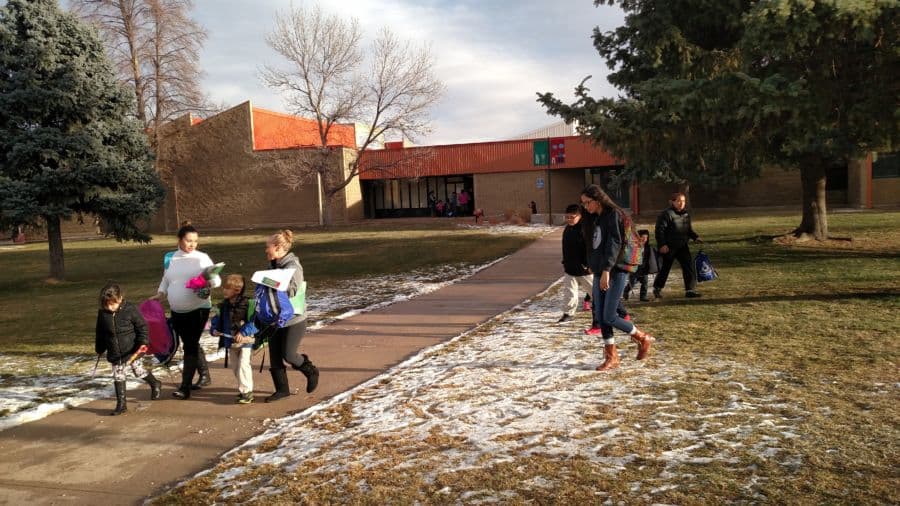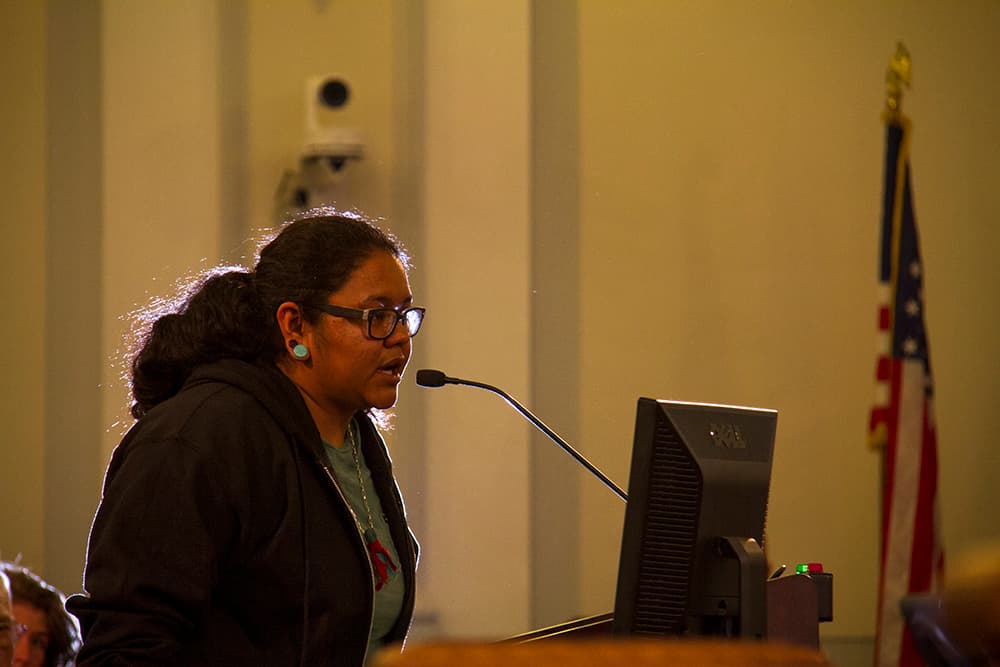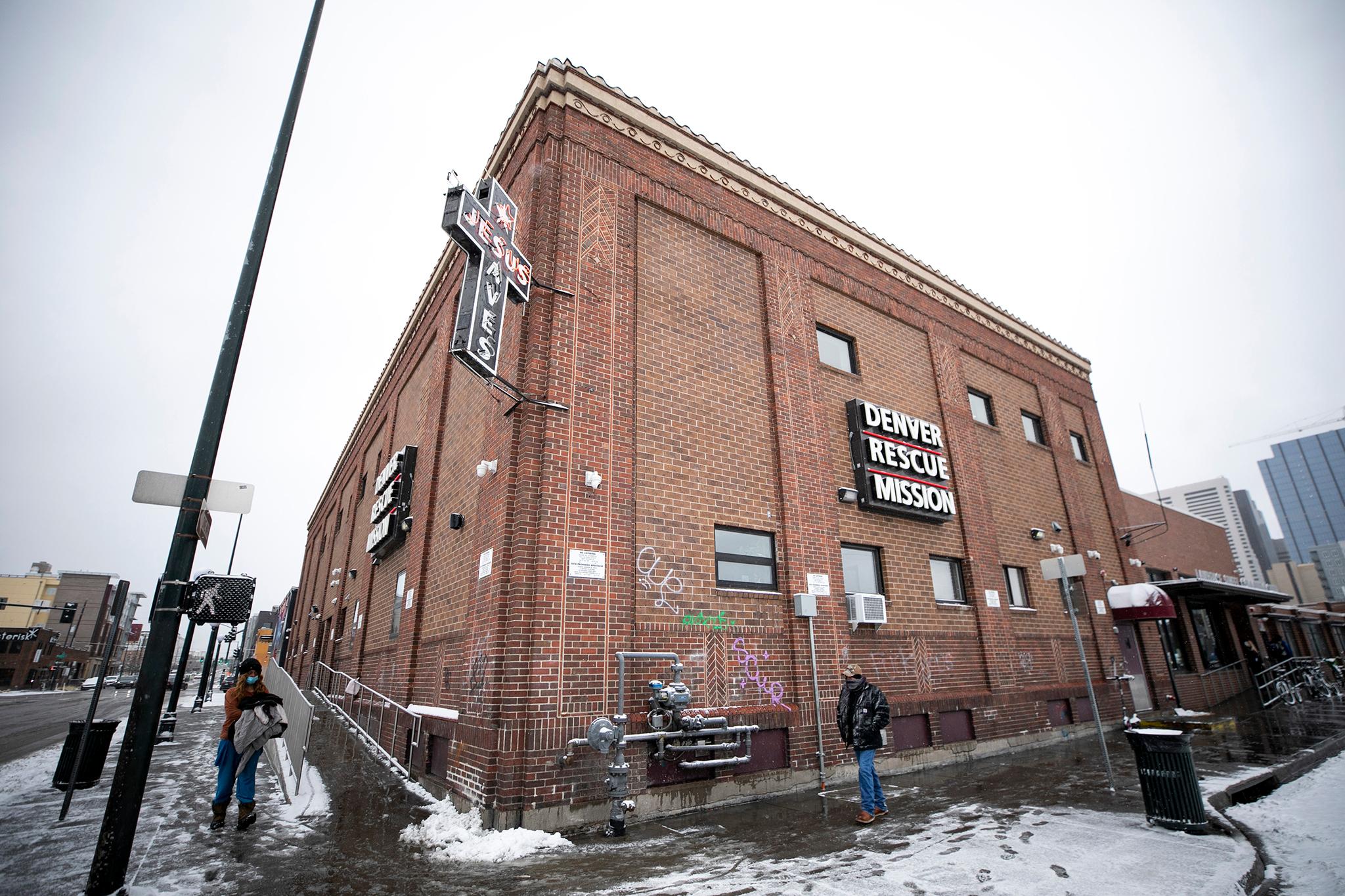
By Eric Gorski, Chalkbeat
Right after school let out, a line formed outside the second-floor staff room at Greenlee Elementary School in Denver. Teachers, staff, janitors and union representatives all crammed into the space to learn the fate of a school that had been on the ropes academically for years.
Denver Public Schools officials delivered the blow: The school would likely close after 2017-18 and be “restarted” with a new program.
What happened next at the meeting last fall epitomizes the challenges facing the state’s largest school district as it juggles two conflicting roles.
Deputy Superintendent Susana Cordova, whose mother attended Greenlee and who still has family in the neighborhood, got emotional as she told the room that district officials shared responsibility in Greenlee’s situation. Cordova pledged to support Principal Sheldon Reynolds’ application to run a replacement program at Greenlee, building on recent gains there.
Superintendent Tom Boasberg, also in the room, made clear that the competition to replace Greenlee would be open, and that he would play no favorites. It will be Boasberg’s job to recommend to the school board next month which applicants should run new programs at Greenlee and another DPS school being closed for poor performance: Amesse Elementary.
“That meeting was a great encapsulation of what it’s like — especially for me, but also for Susana — to be very explicit that we do wear two hats,” Boasberg told Chalkbeat. “It was a very important and challenging conversation.”
Those two hats are school authorizer and school operator. DPS says it has a “firewall” separating those who help run and support district-managed schools, and those who approve schools that make up the district’s nationally recognized “portfolio” of traditional district-run, charter, innovation and magnet schools.
Managing that separation can be complicated, messy and — this year — tension-filled.
Slower enrollment growth, scant opportunities to locate in a district-owned building, more high-quality district-run proposals and other factors have contributed to a contentious process.
In a district that has long supported charter schools, it is charter schools that are leading the criticism. Even after DPS took extra steps this year to address the operator/authorizer conflict, charter operators are saying the restart competitions have not been fair.
Such tensions are not uncommon in school districts, especially at those with significant charter school growth, said Robin Lake, director of the Center on Reinventing Public Education, a research and policy group at the University of Washington.
Bias may not be intentional — especially in districts like Denver committed to different governing structures — but it can be damaging to promoting great schools without labels, she said.
“There can be an internal schizophrenia in the main office about what its core job is,” Lake said.
Tensions are running highest in DPS over the competition for the Amesse restart in northeast Denver.
All three applicants are considered strong: local college-prep charter networks STRIVE Prep and University Prep, and a proposed district-run partnership between nearby McGlone Academy and existing Amesse staff called the Montbello Children’s Network.
University Prep remains an applicant but is no longer in the running after a DPS review found that its plans did not meet the requirements of a court order dictating how English language learners must be educated.
Before that development, University Prep CEO David Singer in an interview with Chalkbeat voiced concerns about how DPS is navigating the operator/authorizer conflict.
“There needs to be a level playing field where families can engage in a process that is not biased in one direction or another,” Singer said. “The process doesn’t feel like it’s in the right place yet.”
STRIVE was more pointed — and specific. Dani Morello, STRIVE’s outreach and engagement manager in far northeast Denver, said in written testimony at a school board meeting last month that the district being “both an authorizer and a restart competitor has been challenging and confusing.”
She said a lack of clear messaging has “led to the narrative within the school community that this process is a choice between applicants looking to change the school and those looking to keep it the same — which we find confusing and misrepresentative of all applicants.”
Morello also cited “differential access” to families and staff — including lists of family contact information made available to the district applicant long before the charter applicants.
STRIVE sees the conflict most evident in the decision to allow DPS’s Office of Family and Community Engagement “to directly organize for the district applicant,” Morello said.
“While we believe this effort is well-intentioned, it has the consequence of parents experiencing messages from district staff in an official capacity speaking about only one applicant, which has exacerbated confusion among families,” she said.
Both district officials and Sara Gips Goodall, principal of McGlone and proposed leader of the Montbello Children’s Network, disputed the STRIVE criticisms.
Goodall said that DPS is not spearheading her school’s application, and that she is “100 percent sure that no parents have experienced a single message from district staff in an official capacity speaking about one applicant.”
Goodall said her team did community outreach early on to gauge interest and incorporate community input into its plan but has since pulled back. She said STRIVE, which has been seeking to build support to open a school in the neighborhood for the past couple of years, has been targeting parents aggressively.
“This is also what makes me sad: I actually view University Prep and STRIVE as some of our partners,” Goodall said. “One reason I moved back to Denver (to help lead McGlone in turnaround efforts) is because I loved the idea that charter-public was a collaboration and not competition.”
Charter schools have “huge” advantages as school applicants, Goodall said, including network staff who have experience navigating the process.
“I’m writing those plans on the weekend at a coffee shop,” she said.
Chris Gibbons, CEO of STRIVE, said the school board testimony had nothing to do with McGlone, and that STRIVE’s concerns rest with the district’s management process.

Boasberg also took issue with some of STRIVE’s claims. He said all Amesse applicants got the same list of family contact information at the same time.“I would want Sara to know that and anyone to know that,” Gibbons said. “The critique of the process is that charter applicants did not have access to information until (their letters of intent to apply) had been received” by DPS, while the district-run applicant had access earlier.
“It is true that one of the applicants did begin to organize and do efforts in the Amesse community earlier,” he said. “But there is nothing that prohibits hard work here.”
Boasberg said DPS’s Office of Family and Community Engagement, or FACE, had “absolutely nothing to do with the process.” DPS created a public affairs team in the superintendent’s office this year to communicate with school communities, taking FACE, which has deep relationships with families in schools, out of that process.
Said Cordova: “The whole idea was to not have a process that seems like it’s rigged.”
Gibbons said that STRIVE in its testimony was making reference to district assistance in the early organizing.
Overall, Boasberg said DPS has worked diligently to build a wall separating school authorizing — overseen by Jennifer Holladay, executive director of DPS’s portfolio management team — and the school operating role led by Cordova, the deputy superintendent.
DPS also has developed policies meant to bring more clarity — and less politics — to decision-making. In the last two years, DPS has laid out specific criteria for closing schools and for awarding district buildings to schools.
“This is not a new conflict,” Boasberg said. “It’s been with us for some time. I do think we in Denver have been more thoughtful and more proactive than any other district in the country.”
DPS this year formed Community Review Boards for both restarts that will weigh applicants against the district’s building allocation criteria and make recommendations to Boasberg. The boards include parent members, community members, professional reviewers and facilitators.
Boasberg underscored how important that new step will be: “I am going to greatly respect the Community Review Board’s recommendation in making my recommendation,” he said.
How Denver navigates the operator/authorizer conflict bears watching, said Martin West, an associate professor of education at the Harvard Graduate School of Education.
“Legitimate questions can be raised about whether a school district can be even-handed in a competition where it is both a player and referee,” West said. “It wouldn’t necessarily require intentionality to create situations where the district-managed school has a big advantage.”

The only charter school to apply was Wyoming-based PODER Academy, and DPS staff this week said its application did not meet the district’s quality standards. The school leader strongly objected to the recommendation that it not be approved.The competition for restarting Greenlee Elementary is not nearly as heated as the one at Amesse.
The restart is all but certain to go to a team led by current Greenlee principal Reynolds, who is proposing a new program called the Center for Talent Development at Greenlee Elementary.
Reynolds’ application promises challenging standards-based instruction, a rich roster of electives and a teacher development pipeline through the University of Colorado Denver.
As Reynolds has emphasized to those doubting whether he should stay at the helm, he is just completing his second year at Greenlee and has seen some positive academic growth after adopting a plan celebrating student accomplishments and strengthening school culture.
Reynolds said he believes the district has approached the process appropriately.
“I’ve definitely had district support, but it’s also been very clear there is a separation between that and them being fair and equitable in the process,” he said.
DPS has been encouraging such entrepreneurial leadership in-house, including replicating successful district-run models in new locations. That deeper pool of district-sponsored applicants is likely a contributing factor to some of the tensions.
Boasberg said he was surprised no local charter network applied for the Greenlee restart, and acknowledged that a perception that Reynolds would prevail likely played a role.
Reflecting on that emotional meeting in the Greenlee Elementary staff room, Cordova said she knows firsthand what happens to communities when things don’t work out. She was part of the team that devised a previous turnaround plan at Greenlee that didn’t succeed.
Cordova emphasized that her primary responsibility as deputy superintendent is to “support and lead our reform efforts in our district-managed schools.”
A few school districts have either relinquished the school operator role or are moving in that direction. Although Denver has experimented with different governance structures — including giving district-run schools more autonomy in a budding “innovation zone” — that is not in the district’s future.
Boasberg said DPS can wear both its operator and authorizer hats.
“It’s absolutely imperative,” he said, “that we do both jobs very well.”
Chalkbeat is a nonprofit news site covering educational change in public schools.











